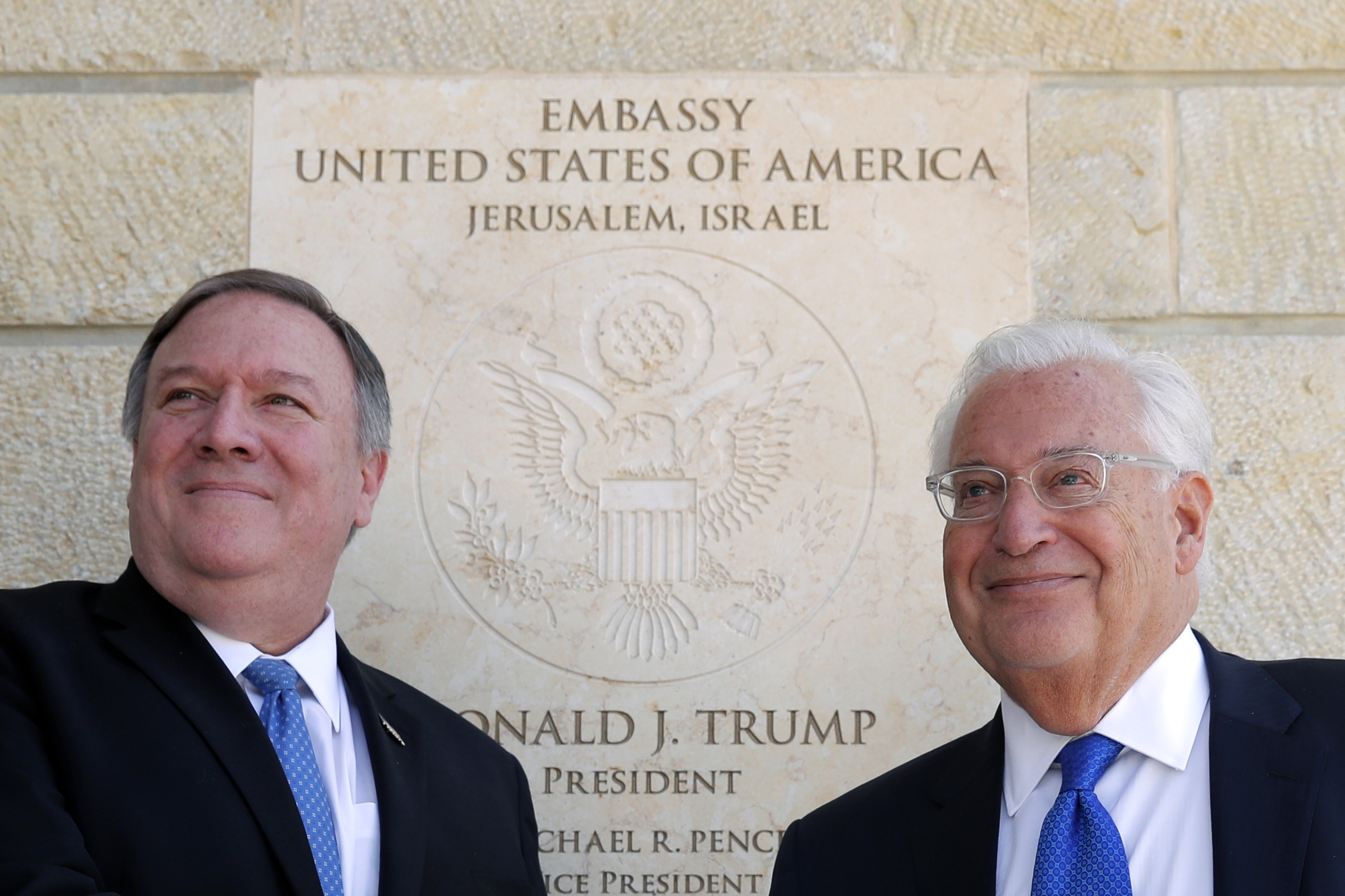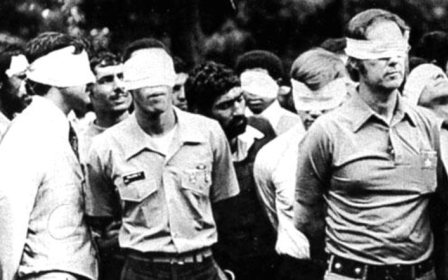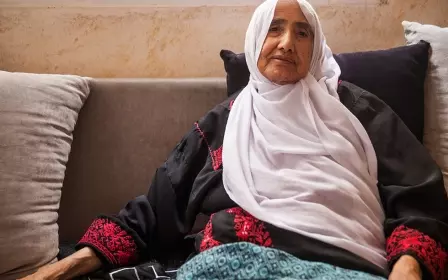Israel approves new permanent US embassy in Jerusalem

Israel approved on Tuesday the construction of a permanent US embassy in Jerusalem, Israeli media reported.
Moshe Leon, the Israeli mayor of Jerusalem, said that US officials had received a green light to construct their embassy in the Allenby Complex, near the Hebron Road in the neighbourhood of Talpiot.
The area falls within West Jerusalem and Israel's 1948 borders, and offers a magnificent panorama of the Old City and the surrounding hills.
Leon said in a statement that “within six months, we will start building the premises and God willing in few years we will be able to inaugurate the permanent building of United States embassy in the capital."
Though Israeli officials have been eager to see Washington's diplomatic presence in the city entrenched, US officials were angered last week over “elements in a transport master plan” that could compromise the embassy's security, Israeli news site Mako reported.
New MEE newsletter: Jerusalem Dispatch
Sign up to get the latest insights and analysis on Israel-Palestine, alongside Turkey Unpacked and other MEE newsletters
After meetings between US officials, the Jerusalem municipality and the Israeli ministry of transport, however, a decision was made to change the route of the city’s light rail and cut one of the planned rail stations that clashed with embassy’s security requirements.
Trump's gifts to Israel
+ Show - HideThe Trump administration's bombshell announcement that it no longer considers Israeli settlements in the occupied West Bank illegal under international law has sent shockwaves through the region.
But it's only the latest in a long line of unilateral gifts offered by Donald Trump to Israel since the president took up residence in the White House in January 2017.
Middle East Eye takes a look at how Trump has promoted Israeli interests at the expense of the Palestinians:
Pro-Israel aides: Friedman, Kushner and Greenblatt
From the first moment Trump stepped in the Oval Office he appointed a raft of aides with close ties to Israel and the settlement movement.
Two of the first, and most prominent, tasked with dealing with the Israel-Palestine conflict were Jared Kushner, his son-in-law, and Jason Greenblatt, his personal lawyer.
Kushner and Greenblatt have been heavily involved in the so-called "deal of the century" peace plan, however their loyalties are heavily weighed in Israel's favour.
Kushner's family are close friends of Israeli Prime Minister Benjamin Netanyahu, and donated money to settlement organisations.
As Middle East envoy, Greenblatt, meanwhile, has consistently defended Israeli actions against Palestinians.
David Friedman, US ambassador to Israel, has been the Israelis' chief cheerleader since taking office in May 2017, telling the New York Times that “under certain circumstances, I think Israel has the right to retain some, but unlikely all, of the West Bank".
In July, Friedman and Greenblatt opened a highly controversial tunnel under the Palestinian neighbourhood of Silwan in occupied East Jerusalem.
The US ambassador was seen taking a hammer to a wall in the ancient archaeological site with particular zeal, in an event organised by settler group ELAD.
Recognising Jerusalem as Israel's capital
In a clear sign that Washington was prepared to upend years of convention and consensus in Israel's favour, Trump announced in December 2018 that the United States recognised Jerusalem as the Israeli capital.
East Jerusalem has been occupied since the 1967 Middle East war, and the Palestinians seek it as their capital of any future state.
The international community has maintained that Jerusalem's status must be agreed upon in a settlement between the Israelis and Palestinians, and in response to Trump's move 128 states condemned the decision in a UN General Assembly vote.
On 14 May 2018 - the 70th anniversary of Israel's founding - the US officially moved its embassy from Tel Aviv to Jerusalem.
Demonstrations erupted in the Gaza Strip and the West Bank, with Israeli forces killing at least 57 Palestinians as Kushner and his wife Ivanka Trump grinned at the embassy's opening.
Cutting funds for UNRWA
In early 2019, the US cut all funding to the UN agency that supports Palestinian refugees, UNRWA, saying its business model and fiscal practices were of an "irredeemably flawed operation".
UNRWA provides services to about five million Palestinian refugees, with the US a significant donor since the agency's founding following the 1948 creation of Israel.
In 2018, Washington gave UNRWA $125m in aid, and the agency has scrambled to make up for the sudden shortage.
The Golan Heights
In another unilateral decision, Trump in March announced that the US recognised Israeli sovereignty over the occupied Golan Heights.
The Golan was captured from Syria in 1967 and is both highly strategic and resource-rich. The majority of its inhabitants are Syrian Druze, who largely refuse to engage with Israeli rule.
Some 20,000 illegal Israeli settlers also live on the plateau.
Trump's decree was a gift to Israeli Prime Minister Benjamin Netanyahu ahead of the April elections, and was signed in his presence alongside Friedman, Greenblatt and Kushner.
The US embassy in Jerusalem is highly controversial.
Occupied by Israel in 1967 and later annexed in a move that remains unrecognised by the international community, Jerusalem's status has historically been left to negotiations between Israel and the Palestinians.
However, in December 2017, US President Donald Trump unilaterally recognised Jerusalem as Israel’s capital, subsequently moving the embassy from Tel Aviv in May 2018.
Palestinian leaders want East Jerusalem to be the capital of a future Palestinian state, and view the US embassy move as evidence Washington supports Israel's de facto annexation of the city.
The current US embassy is in a building in the Arnona neighbourhood, used in the past as a visa consulate. The area lies on the border between East and West Jerusalem, and was largely off limits until Israel seized the entire city.
Multiple US allies condemned the move, and on its inauguration in May 2018 Israeli forces violently cracked down on a Palestinian protest in the Gaza Strip, killing more than 50 Palestinian protesters.
Middle East Eye delivers independent and unrivalled coverage and analysis of the Middle East, North Africa and beyond. To learn more about republishing this content and the associated fees, please fill out this form. More about MEE can be found here.




